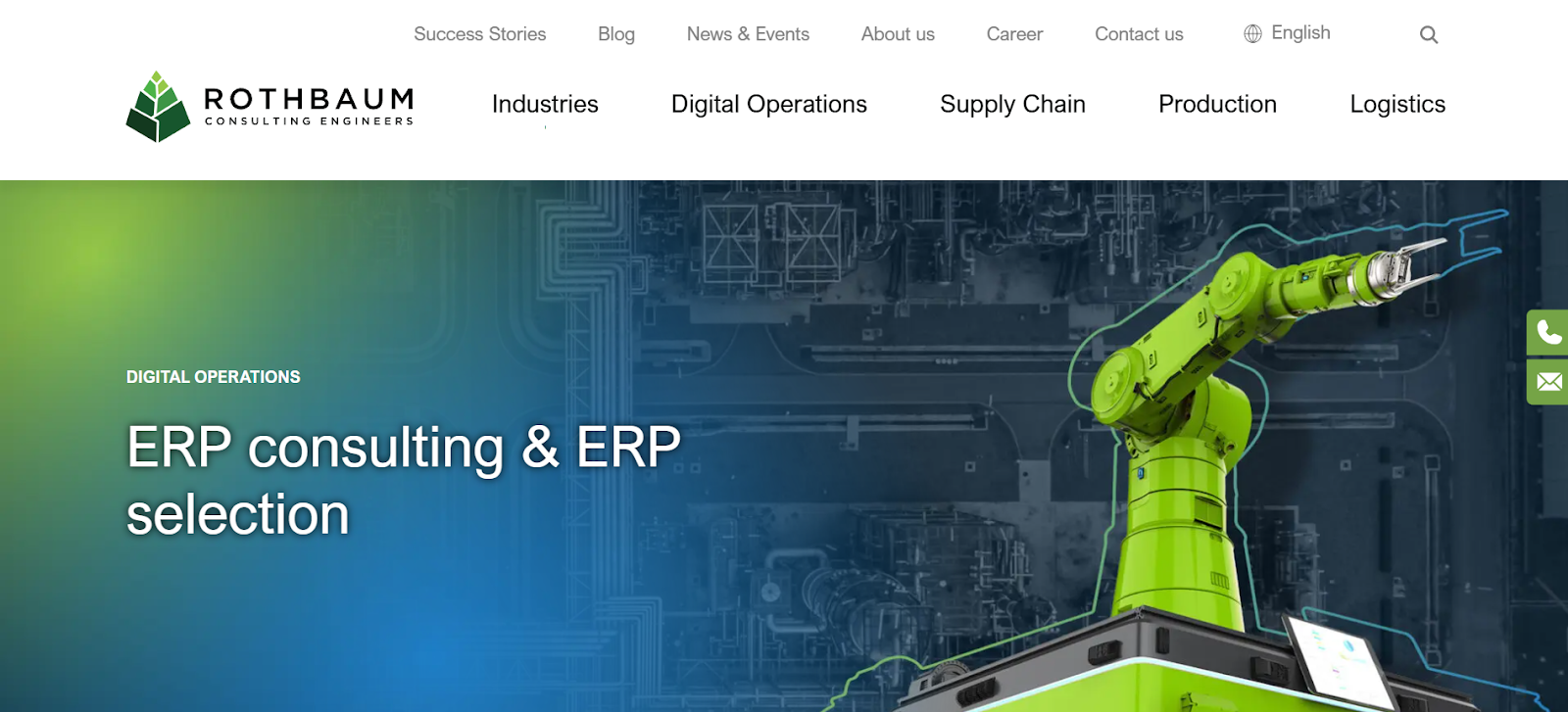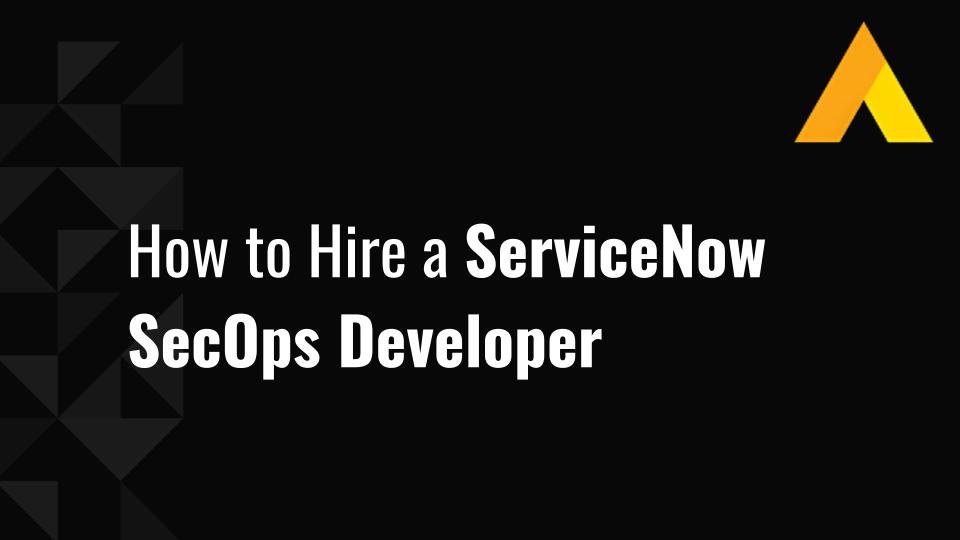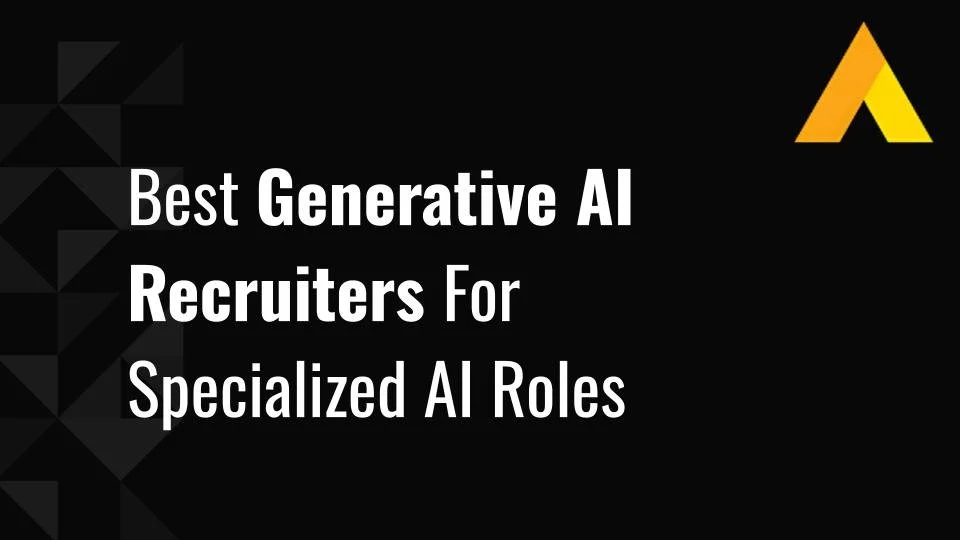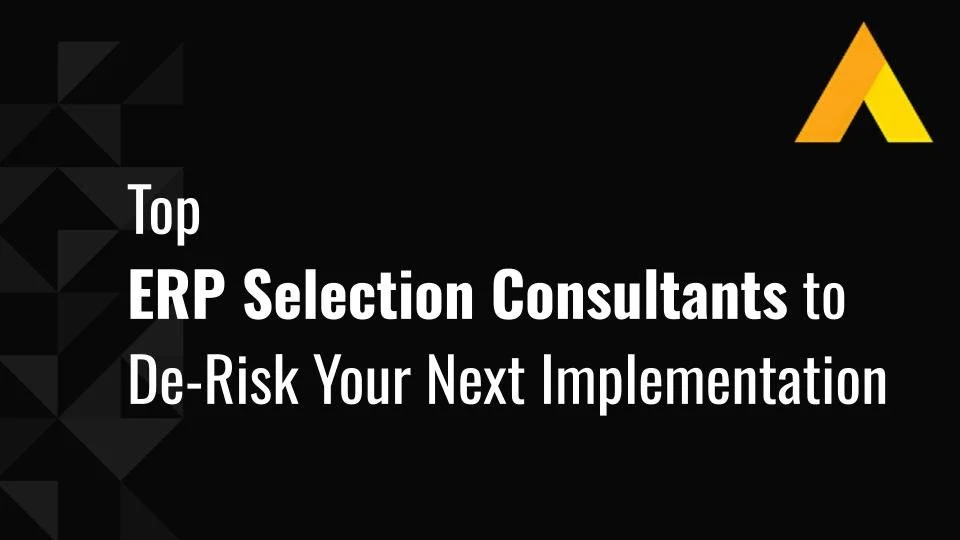Top 10 ERP Selection Consultants to De-Risk Your Next Implementation
Selecting the right ERP system is one of the most expensive and risky decisions you’ll make. Multi-million-dollar budgets, long project timelines, and operational disruption are all on the line.
These risks are all real, and studies support this claim. Between 55% and 75% of ERP projects fail to meet their objectives. This usually happens because of unclear requirements, biased vendor pitches, or underestimating the scale of change.
That’s why working with a proven, vendor-neutral ERP consultant matters. You gain structured evaluation, better contract terms, and measurable results.
In this article, you’ll see the top options so you can pick a consulting firm without making a mistake.
First, let’s define what ERP selection consulting really involves.
What Is ERP Selection Consulting?
ERP selection consulting is the process of guiding you through requirements gathering, vendor evaluation, contract negotiation, and oversight during ERP implementation.
A consultant gives you structured support that:
Reduces bias
Strengthens decision-making
Makes sure every business requirement is translated into measurable outcomes
Unlike ERP vendors, who push their own software solutions, consultants stay neutral and align recommendations with your long-term business goals.
And the market itself shows the scale of this need.
According to Verified Market Reports, ERP consulting and integration services were valued at over $50 billion in 2024 and are projected to grow to $95.5 billion by 2033.
If you want to see how this role plays out in practice, here’s a short video to watch:
Why ERP Selection Is So High-Risk
Choosing the wrong enterprise resource planning system puts your operations, budgets, and timelines at risk. A multi-year commitment to the wrong platform can slow your business processes and disrupt finance, operations, and the supply chain.
That risk is more than theoretical.
According to research, 78% of companies experience cost overruns of at least 10%, with average overruns closer to 23%. For you, that could mean tens of millions added to project costs that were never planned.
Delays are just as damaging seeing as half of all projects fail to go live on schedule.
This can stretch timelines by months or even years and leave you stuck running outdated systems longer than expected.
The reality is that ERP selection leaves little margin for error.
If your process is vague or your internal team is stretched thin, the risk of failure rises quickly. When ERP vendors dominate the decision, the odds of costly mistakes climb even higher.
Benefits of Hiring an ERP Selection Consultant
Hiring an independent consultant doesn't just give extra bandwidth. You'll experience structure and accountability in a process where the risks are high. Also, you avoid relying on vendor promises and gain a partner who translates your business requirements into measurable results.
The main benefits are:
Risk reduction: A structured evaluation framework weeds out poor-fit vendors before they consume your budget. A disciplined process lowers your odds of becoming part of that statistic.
Faster time-to-value: Milestone deliverables and strict accountability shorten the lag between selection and go-live. NetSuite data shows that organizations working with consultants reach an 85% success rate, compared to much lower outcomes in vendor-led projects.
Better ROI: Alignment of processes, strong change management, and expert contract negotiation drive measurable financial impact. When guided properly by a good consultant, successful ERP implementation can generate returns between 120% and 600%. This is a swing that decides whether your system becomes a source of cost savings or a sunk cost.
In the next section, you’ll see which consulting firms stand out and how their methods compare.
Pro tip: ERP implementations fail when roles and reporting lines are unclear. Check our organizational design guide to see how firms tackle this challenge.
TL;DR: A Snapshot of Leading ERP Consulting Options
If you want a quick view of the main consulting firms, here are the essentials. The comparisons show where each stands. The firms to note are:
Alpha Apex Group: You work with a team that delivers ERP selections tied directly to ROI, with contract negotiations closing gaps in licensing terms and integration fees. Our structured risk management reduces delays and claims, which gives you faster time-to-value.
ERP Advisors Group: This company focuses on a structured methodology that covers requirements, testing, and vendor scoring. It relies on independence, which avoids bias but requires significant client involvement.
Panorama Consulting Group: Panorama has a step-by-step model for vendor evaluations and contract negotiations. Its neutrality avoids vendor influence, but the process can extend timelines.
Plante & Moran: The firm offers lifecycle support that spans selection, implementation advisory, and recovery services. Its industry specialists draw from sector-specific experience.
VantagePoint: VantagePoint focuses on a procurement-style approach with ERP shortlisting and financial system expertise. Its process includes scoping, evaluations, and contract support.
Top ERP Selection Consultants and Consulting Services
Choosing the right partner can determine whether your ERP implementation delivers measurable results or drains resources. To help you reduce risk and strengthen outcomes, here are the top ERP selection consulting firms known for proven methods and industry expertise.
1. Alpha Apex Group
Alpha Apex Group helps you approach ERP projects with strategies that reduce risk and deliver measurable results. Our consultants design ERP implementation paths that fit your organizational goals, from finance to operations.
Our thought leaders also conduct original research and proprietary audits so you can avoid wasted spend and long delays.
As such, we can guide advanced technology integration. This gives you ERP systems that support growth and scale without disrupting day-to-day operations.
Besides, Alpha Apex Group applies proactive risk management to identify threats early and prevent them from turning into costly setbacks. Our implementation strategies align with your business processes and use clear milestones to keep projects on track.
In one recent project, we helped a Fortune 500 client speed up post-merger integration using our Culture Performance Intelligence™ system.
The platform combines AI insights with leadership alignment tools to spot cultural friction early and turn it into action. Within a few months, the client saw:
87% stronger leadership alignment
92% talent retention
32% higher productivity
$4.2M in cost savings
As you can see, it’s a practical, data-driven way to connect culture with real business outcomes. And we can apply the same principles in your case, too.
Industries:
Manufacturing, healthcare, distribution, professional services, retail, and construction.
Key Services:
Custom ERP implementation that adapts to specific business requirements.
System integration that improves efficiency by linking ERP to your current tools.
Module development for specialized functions that standard ERP cannot cover.
Ongoing optimization to keep ERP systems stable and high-performing.
Why work with Alpha Apex Group?
Alpha Apex Group gives you more than technical deployment. We provide leadership that ties ERP decisions to financial outcomes. This can help you cut overruns and achieve faster time-to-value. Alpha Apex Group is a partner that can easily strengthen both your operations and your bottom line.
2. ERP Advisors Group
ERP Advisors Group operates as an independent consulting firm that does not sell software or accept vendor commissions. Its work centers on ERP selection and implementation support. This includes requirements confirmation, testing, change management, data migration, and go-live cutover.
One example involved a Denver-based data center company, where ERP Advisors evaluated over 40 applications using 11 criteria. Then, the company recommended a platform that scaled rapidly while automating complex processes.
While its independence ensures objectivity, it can also limit access to vendor incentives or bundled discounts.
Industries:
Manufacturing, field services, construction, professional services, and nonprofits.
Key Services:
Needs analyses and software evaluations conducted across multiple industries each year.
Contract negotiation informed by experience handling millions in ERP agreements.
Oversight of vendor demonstrations to assess functionality and fit.
Proven methodologies designed to reduce project failure risk.
Why work with ERP Advisors Group?
ERP Advisors Group offers a depth of independence in ERP consulting. Its combination of methodology and cross-industry experience ensures ERP decisions are based on client requirements rather than vendor agendas.
3. Panorama Consulting Group
Panorama Consulting Group is a vendor-neutral ERP advisory firm. It provides ERP selection and implementation oversight, contract negotiation support, and training designed to align stakeholders around project goals.
In one case, Panorama worked with a global consumer products company operating in 30+ countries. The company selected a system that covered almost all requirements and negotiated fixed costs below benchmarks.
Because Panorama serves a wide range of industries, it may provide less depth in niche sectors with highly specific workflows.
Industries:
Manufacturing, government, healthcare, retail, energy, food & beverage, agriculture, aerospace, construction, and professional services.
Key Services:
ERP system assessments with requirements gathering and structured evaluation steps.
Contract negotiation to secure terms and lower upfront and long-term costs.
Implementation support through training, adoption planning, and oversight.
Expert witness services based on experience with ERP-related disputes.
Why work with Panorama Consulting Group?
Panorama offers a structured, multi-stage selection process that connects ERP choices to long-term planning. Its experience with litigation provides added insight into failure points and risk factors.
4. Plante & Moran
Plante & Moran delivers ERP advisory services within a broader enterprise application framework. they can help you with assessments, ERP selection, contract review, implementation support, and recovery of underperforming projects.
The company has completed an ERP selection for a medical equipment manufacturer in four months. It secured over $500,000 in savings while reducing contract risk.
Plante & Moran's services extend beyond ERP into areas such as analytics, cybersecurity, and cloud migration. Therefore, engagements can sometimes expand in scope and create added complexity.
Industries:
Manufacturing, healthcare, government, construction, distribution, and education.
Key Services:
ERP roadmaps that define requirements, dependencies, and project timing.
Implementation advisory with governance, testing, and user adoption oversight.
Optimization and recovery services for stalled or underperforming ERP systems.
Platform support that extends ERP with analytics, automation, and cloud services.
Why work with Plante & Moran?
Plante & Moran provides continuity across the full ERP lifecycle. Its consultants bring prior industry experience and apply structured advisory methods that cover selection, deployment, and long-term optimization.
5. VantagePoint
VantagePoint provides ERP supplier selection services with a structured, multi-stage methodology. Its process integrates procurement practices, vendor evaluation, and project experience. This addresses issues like unclear requirements, incomplete vendor responses, and limited market knowledge.
In one project for Mainstream (Renewable Energy, Ireland), VantagePoint consolidated and automated budgeting and reporting workflows. While its structured approach reduces risks of misalignment, it can extend timelines compared to leaner evaluation methods.
Industries:
Finance, technology-driven sectors, renewable energy, and professional services.
Key Services:
Scoping and planning to define objectives and project requirements early.
Requirements definition covering technical, functional, and commercial needs.
Vendor shortlisting and evaluation supported by market insights.
Contract negotiation designed to improve commercial terms with ERP providers.
Why work with VantagePoint?
VantagePoint applies a staged selection model that focuses on requirement clarity and vendor evaluation. Its consulting also brings expertise in enterprise performance management. This supports clients with financial planning and reporting needs alongside ERP selection.
6. Pemeco Consulting
Pemeco Consulting has delivered more than 700 ERP and technology projects over the past 40 years. Its selection framework is built around a structured process that includes needs assessment, vendor pre-qualification, due diligence, implementation scoping, and contract negotiation.
A Johannesburg Metrobus case shows how Pemeco guided the company through ERP selection and deployment. The company did this on Oracle’s platform to manage 532 buses serving 90,000 passengers daily.
While its methodology offers rigor, it can also create heavier workloads for internal teams. This is because detailed data gathering and validation are required at multiple stages of the process.
Industries:
Public transit, aerospace, manufacturing, energy, and more.
Key Services:
Vendor evaluation using Pemeco’s 8 Dimensions of Vendor Fit.
ERP optimization services to improve planning accuracy, scheduling, and forecasting.
Contract support designed to minimize risk and secure favorable commercial terms.
Development of tools and published resources.
Why work with Pemeco Consulting?
Pemeco Consulting offers structured frameworks that quantify vendor fit across multiple criteria. This approach allows clients to compare options on measurable factors and reduce uncertainty when making ERP investment decisions.
7. Rothbaum Consulting Engineers
Rothbaum Consulting Engineers provides independent ERP advisory services covering selection, implementation, and organizational development. Its work starts with a detailed review of business processes and system landscapes before shortlisting vendors.
The company acts as a bridge between departments and technology providers. It also translates operational requirements into system configurations.
Publicly, the firm cites a portfolio of more than 200 projects across ERP, operations, and digital transformation. One drawback of this approach is that the extensive upfront analysis may slow initial decision-making compared to firms that move more quickly.
Industries:
Manufacturing, logistics, digital operations, supply chain, and SAP ERP transformations.
Key Services:
Vendor evaluation packages, including RFP design, workshops, and negotiation support.
ERP implementation oversight with project management, training, and testing.
Process redesign services to develop lean, end-to-end workflows.
System landscape reviews to identify risks and define target digital architecture.
Why work with Rothbaum Consulting Engineers?
The firm focuses on ERP as part of broader organizational development and aligns systems with cultural and structural shifts. This perspective integrates technology adoption with long-term operational planning.
Pro tip: Vendors typically bury long-term cost escalations in the fine print. If you want to avoid unexpected expenses down the line, check out our guide on SAP contract negotiation.
8. 180 Systems
180 Systems provides ERP software selection services with a methodology built on Critical Success Factors (CSFs) linked to measurable KPIs. Its process includes business process reviews, structured requirements analysis, and vendor demonstrations.
The company has supported more than 150 clients, usually stepping in when internal IT teams lack ERP selection expertise. In one aerospace case, its ERP action plan improved planning accuracy and cut budgeting labor significantly.
A potential drawback is that its detailed planning requires considerable client participation early in the project.
Industries:
Aerospace, manufacturing, distribution, professional services, energy, and technology.
Key Services:
Business process reviews with interviews, process documentation, and workflow mapping.
Requirements analysis focused on clarity, prioritization, and testable selection criteria.
Vendor RFP management with scoring, cost breakdowns, and structured comparisons.
Evaluation of both ERP systems and implementation partners for alignment and delivery.
Why work with 180 Systems?
The firm applies a KPI-driven approach that ties ERP requirements to business performance metrics. This focus on measurable outcomes shapes ERP decisions around defined operational goals.
9. Hartman Advisors
Hartman Advisors approaches ERP as a business transformation rather than just an IT upgrade. They focus on cross-departmental alignment and long-term value creation, which can extend timelines compared to faster selection models.
The company uses a multi-phase methodology that includes workflow reviews, RFIs, RFPs, structured demos, and scoring systems to narrow down vendors. Change management is a central focus, with communication strategies, stakeholder engagement, and training programs built into every engagement.
Industries:
Construction, healthcare, financial services, government, nonprofits, education, and retail.
Key Services:
Vendor-neutral ERP selection supported by structured RFIs, RFPs, and scoring tools.
Change management programs built around training, communication planning, and adoption strategies.
Implementation oversight, including project governance and risk monitoring.
Workflow analysis and stakeholder interviews to confirm business needs before vendor selection.
Why work with Hartman Advisors?
Hartman Advisors brings executive-level IT leadership experience into ERP decision-making. Its structured advisory process frames ERP as a strategic business choice. This balances technology adoption with organizational readiness and governance.
10. Dreher Consulting
Dreher Consulting delivers ERP selection services through a structured five-step methodology covering analysis, requirements, vendor evaluation, and contract management. Their team focuses on risk minimization and uses detailed checklists, questionnaires, and templates to reduce selection errors.
One of its case studies involved a multinational ERP rollout where workshops and structured collaboration supported standardization across sites. The firm typically includes digitalization, supply chain optimization, and AI-readiness in its assessments, which broadens projects beyond ERP alone.
This broad scope can, indeed, give you a comprehensive view, but it can also increase complexity and extend timelines.
Industries:
Manufacturing, logistics, energy, professional services, and the public sector.
Key Services:
Situation analysis, including digital transformation, supply chain, and cost efficiency reviews.
Vendor identification and qualification supported by pre-defined criteria and risk models.
Functional specification development tailored to future business needs.
Quality management and test management to validate vendor performance before project closure.
Why work with Dreher Consulting?
Dreher emphasizes employee involvement from the outset to reduce resistance and improve adoption. Its methodology is designed to align competitive advantage with ERP design, which supports sustainable return on investment once systems are deployed.
What to Look for in a Top ERP Selection Consulting Firm
The partner you choose will shape the outcome of your ERP consulting project. A weak advisor leaves you with vendor-driven decisions, while a strong one gives you structure, accountability, and measurable results.
The qualities that matter most are:
Independence and vendor neutrality: You avoid biased recommendations and gain vendor-neutral advice based on a business needs assessment.
Clear, step-by-step methodology: A proven framework reduces risk by setting milestones across the project lifecycle, from requirements to contract terms.
Industry specialization: Consultants with direct experience in manufacturing, healthcare, or distribution can tie ERP choices to real critical success factors in those fields.
Track record: Years of delivery, client outcomes, and successful implementation outcomes show you what to expect in terms of reliability and ROI.
Full lifecycle services: From selection to post-implementation support, you get continuity that reduces disruption and improves adoption across your teams.
Pro tip: Workforce optimization doesn't just mean cutting costs. It means aligning talent with business goals. To see how firms approach this balance, check out our full guide.
Conclusion: Pick the Right ERP with Alpha Apex Group
ERP selection is a high-stakes decision that can define your company’s financial and operational future. A wrong choice drains capital, delays schedules, and disrupts critical business systems for years.
The truth is, the difference between failed and successful projects comes down to process discipline, unbiased guidance, and proven experience. A consulting partner who applies structured risk management and focuses on measurable results gives you a safeguard against overruns and failure.
This first step gives you the confidence to begin modernization without unnecessary risk.
To protect your investment and drive meaningful outcomes from your next software selection, contact Alpha Apex Group for a risk-free ERP assessment.
FAQs
What does an ERP consultant do?
An ERP consultant leads you through requirements gathering, software assessment, and vendor demonstrations. This ensures your final choice fits both operational and financial goals.
How long does a typical ERP selection process take?
Timelines depend on company size and project scope. ERP Research reports that small and mid-sized firms usually complete implementation in 3-9 months, while large enterprises take 6-18 months. With Alpha Apex Group, you gain a structured evaluation that cuts decision-making time and helps you move forward with confidence much faster.
What’s the difference between an ERP vendor and an ERP consultant?
Vendors sell their own ERP software and focus on product features. Consultants remain vendor-neutral while guiding you through comparison, negotiation, and system fit.
How much does ERP consulting usually cost?
Some independent firms, such as Terillium, quote U.S. rates of $175 to $225 per hour. Costs vary depending on scope, including implementation services, data migration, and user training.
What industries benefit most from ERP consulting?
Manufacturing, healthcare, distribution, and professional services see the most measurable value. That’s because these industries depend on integrated enterprise software to manage complex supply chains, compliance needs, and multi-entity operations.
How do ERP consultants help prevent project failure?
Consultants enforce structured milestones, vendor neutrality, and a best practice implementation methodology. This reduces delays, keeps budgets on track, and increases adoption rates.





























